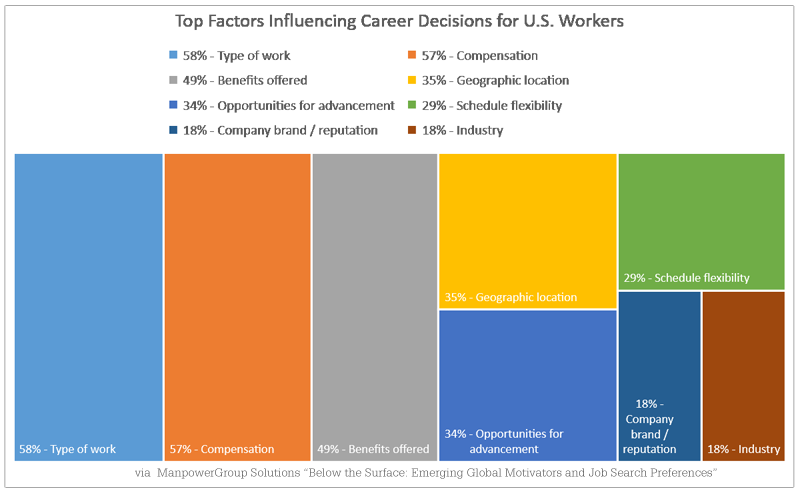A global study by Manpower Group Solutions cites “type of work” as the top reason employees leave. Employers and HR leaders charged with keeping top employees may improve efforts by updating traditional employee reviews to include opportunities to modify an employee’s role, as well as salary.
Top Reasons U.S. Workers Leave Provide Clues for Keeping Top Employees
Manpower Group Solutions whitepaper “Below the Surface: Emerging Global Motivators and Job Search Preferences” offers clues HR and staffing agencies can use to improve not only recruiting efforts, but retention efforts as well. Factors that impact U.S. employee career decisions:
- 58% – Type of work
- 57% – Compensation
- 49% – Benefits offered
- 35% – Geographic location
- 34% – Opportunities for advancement
- 29% – Schedule flexibility
- 18% – Company brand / reputation
- 18% – Industry

Not only is “opportunities for advancement” listed as a top consideration for U.S. workers in general, it relates to the top reason U.S. employees say they leave for other employers: Type of work.
Both of these career decision factors – type of work and opportunities for advancement – are even more important to today’s younger workers, with more than one third of Gen X and nearly half of Gen Y workers citing it as a top consideration. HR leaders and business owners who persuade workers that there is room for change and upward mobility within the organization may have more success in keeping top employees on board who might otherwise leave for another employer where they perceive increased opportunities exist.
Keeping Top Talent – Making Role Review Part of the Employee Review Process
The traditional employee review speaks to a worker’s performance against their current duties and salary. While some employers may leave the door open for an employee to talk about their future aspirations, its uncommon for an employer to provide significant latitude for employees to weigh in on their current role and list of responsibilities.
Managers who regularly engage staff about the type of work they are doing, are interested in doing, most enjoy doing, and least enjoy will be more likely to uncover a worker’s dissatisfaction with the type of work they are doing before losing top employees to other employers. This could be especially helpful for HR leaders and business owners in small and mid-sized companies, where an employee may perceive few opportunities for advancement exist.
Employee development programs, team building workshops and employee satisfaction surveys can also be helpful in discovering strengths and abilities managers – or even employees themselves – may not have been aware of. For instance, Gallup’s StrengthsFinder 2.0 by Tom Rath includes the same StrengthsFinder assessment that can be completed individually online. Identifying the strengths and preferences of workers isn’t just about giving people a chance to do work that is enjoyable and meaningful to them, it can also help employers identify role changes that might make workers more productive – and their business more profitable – in the process.
According to Gallup.com, “People who use their strengths every day are six times more likely to be engaged on the job.” StrengthsFinder 2.0 and similar resources also provide guidance for managers, so that every leader in a business from the owner to department manager or team leader is on the same page when it comes to using an individual’s strengths as motivator, barometer and even for setting performance goals.
Employee Retention – 4 Questions to Make Anyone’s Type of Work More Meaningful
Here are three questions business owners and HR leaders can ask about anyone’s role within the company to identify ways in which an employee’s role could be make more meaningful – impossible to replicate in any other workplace. The first three questions come from a buffer.com post which was re-shared by Jeff Haden on Inc.com; the fourth question is derived from an American Psychological Association (apa.org) report on psychologist discoveries of what makes work meaningful and “how to create value in any job.”
- Autonomy: How much control does the employee have over their own choices?
- Complexity: Does the employee have opportunities to master new skills and improve?
- Connection: Does the worker see a payoff – a connection between effort and reward?
- Aspiration: Does the worker feel an innate higher calling to their job or type of work, or that fulfilling their responsibilities supplies what might be an intangible “good” for someone else?
Employee retention can reduce expenses and give your company the competitive advantage it needs to win in a competitive marketplace, but many companies expend far more on recruiting and hiring than on efforts to keep top employees. Make sure you’re in touch with workers to ensure they are satisfied with the type of work they have to do today and what they feel their role is in the future.
You might also like: A Bad Employer Rap Can Scare Top Talent Away








Leave a Reply
Want to join the discussion?Feel free to contribute!